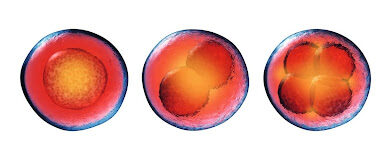April 15, 2024
The Stages Of Embryo Development: Your Baby In The Womb

Conception can happen at any time in the week or two following sexual intercourse. But for those trying to conceive who want a little more detail about how babies are made, we have you covered. Embryo development is a fascinating and intricate process that marks the beginning of life for many organisms, including humans.
Stages Of Embryo Development
Embryo development consists of a series of well-coordinated steps, each contributing to the formation of a fully developed organism. From fertilization to the formation of complex tissues and organs, Island Reproductive Services is here to help you understand the stages of embryo development.
Fertilization
The journey of embryo development begins with fertilization. In humans, this occurs when a sperm cell penetrates the egg cell, forming a zygote. The zygote contains the full set of genetic material, half from each parent, and represents the start of a new individual. Fertilization typically takes place in the fallopian tubes of the female reproductive system.
Blastulation
The blastocyst is a pivotal stage in embryo development. It consists of an outer layer of cells called the trophectoderm, which will later give rise to the placenta, and an inner cell mass that will develop into the baby itself. The blastocyst undergoes a process called blastulation, during which it forms a fluid-filled cavity.
Implantation
The blastocyst now moves toward the uterus, where it undergoes implantation. Implantation involves the attachment of the blastocyst to the uterine lining. This critical step establishes the connection between the developing embryo and the mother’s body, facilitating the exchange of nutrients and waste products. During this time, the embryo is about 1/100 of an inch long.
Fetal Development
As the blastocyst completes its journey to implantation within the uterine lining, it transforms into a fetus, marking a pivotal stage in its development. During this phase, significant anatomical transformations occur. Crucial structures and organs like the neural tube (which later becomes the brain and spinal cord), head, eyes, mouth, and limbs form. The embryo’s heart begins to develop and pulse around the sixth week. Around the tenth to twelfth week of gestation, the focus shifts to growth and refinement. The organs continue to mature, and the fetus becomes more recognizable as a human being. This period is marked by rapid growth, and the developing organism is now referred to as a fetus rather than an embryo.
Maturation And Birth
The final step in embryo development culminates in the maturation and birth of the organism. The fully formed fetus is ready to face the external environment. The day your baby is due is called your estimated due date (EDD). However, only about 1 in 20 women give birth on their due date.
The process of birth involves the contractions of the uterus, leading to welcoming your little miracle to the world. The average labor lasts 12 to 24 hours for a first birth and is typically shorter (eight to 10 hours) for other births. However, time can vary greatly depending on each mother’s individual case.
Understanding the steps of embryo development is not only a testament to the complexity of life but also essential for mothers-to-be and couples. At Island Reproductive Services, after learning about your goals, your past history, and often your apprehensions, treatment options are discussed with you and/or your partner. Your individual needs become our motivation. We are experts in providing the care that your situation requires. For more information or questions about embryo development, check out our website or give us a call at (718) 948-6100.


